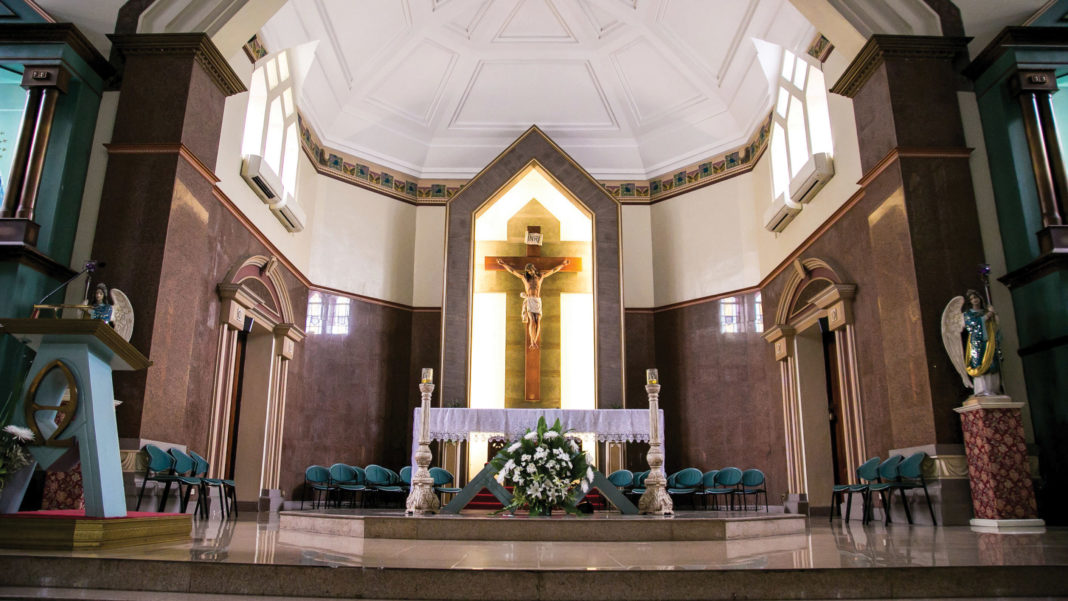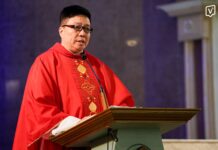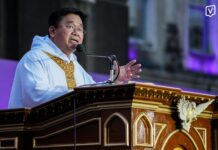The Catholic Church does not meddle in politics, and its role during elections is to educate voters, an official of the Catholic Bishops’ Conference of Philippines (CBCP) said during the eighth Philippine Conference on New Evangelization (PCNE).
“The Church is merely asking to present her policy views and to respect her right to participate in public debate without its religion and ministers being impugned. Karapatan din ng Simbahan na makisangkot, makihayag, at makialam sa lahat ng Pilipino kung ano ang kanyang pananaw at saloobin sa mga nangyayari sa ating lipunan,” Fr. Jerome Secillano, executive secretary of the CBCP Committee on Public Affairs, said during his talk on Oct. 23.
According to the Canon Law (Code of Canon Law, Canon 285, No. 3), clerics are prohibited from running and accepting any government positions since “they entail sharing in the exercise of civil power,” he stressed.
The Archdiocese of Manila’s Commission on Social Communication has launched the “One Godly Vote” campaign, which Secillano said aims to “educate voters and evangelize the political system.”
“[One Godly Vote] is not a promotion of Catholic dogmas or doctrines but a means to achieve greater understanding of societal issues leading voters to make informed choices during the election,” Secillano said.
He emphasized that the voters’ education program is not a means to endorse any candidate in the 2022 elections.
“Our motivation is to achieve a renewed kind of politics by focusing more on the following: moral principles than on the latest polls; the concern and needs of the weak than on benefits for the strong and powerful; and the pursuit of the common good rather than on the demands of narrow and selfish interests,” he said.
Citing the letter “Living the Gospel of Life” by the United States Conference of Catholic Bishops, Secillano called on Filipino voters “to see beyond party politics, analyze campaign rhetoric critically and to choose their political leaders according to principle, not simply party affiliation or mere self-interest.”
He stressed that elections are a “serious matter,” and it is the Church’s prophetic role to “speak the truth no matter how painful it is.”
“They should not compromise their votes. They should shun money, they should not be cowed by intimidation, they should not be swayed by empty, shallow and outrageous promises, and they need to hold on to the sacredness of their vote as if their choice is God’s choice to lead us to our future,” he said.
Saying ‘yes’ to God’s mission
Cardinal Jose Advincula called on Catholics to bring hope to others despite one’s hardships during the closing Mass on Oct. 24.
“Take courage, get up. Jesus is calling you. We are called to encourage others, give them hope, and boost their morale. We are called to help others to get up, start anew and not to put them down,” the Manila archbishop said in his homily during the Mass in the Chapel of the Eucharistic Lord at SM Megamall in Mandaluyong.
Advincula said prayer is “truly authentic” if it involves others.
“Sometimes when we are too absorbed with our own concerns. [W]e may tend to forget that we are also called to be concerned about others—to help and bring others to Christ,” he said.
Thomasian alumnus Christian Lubaton, medical director of a private clinic, said life’s trials led him to discover his mission.
“God calls us for a certain purpose; that purpose for me came from pain. I grew up with a large family. My dad got sick and eventually passed away. I was searching for meaning and healing, and God led me to become a doctor,” Lubaton said.
Lubaton said mission is journeying and sharing the gift of faith with others.
“I surround myself with people na lumalaban, kaya lalaban din ako. I surround myself with people na matatapang, kaya tatapang din ako. I surround myself na nagmamahal at nagmamalasakit,” he said.
“We are fellow missionaries in life and whatever God has called us into, [we] say yes. He did not call us alone; we are here and better together,” he added.
This year’s PCNE was held online for the first time. It was postponed last year due to the Covid-19 pandemic. The three-day conference was divided into two series.
Its main theme, “’For a Synodal Church: Encounter, Participation and Mission,” was in line with the Synod on Synodality called by Pope Francis to institute greater participation and consultation within the Church.
Series 1 focused on the “Synodality in the history of the Church,” “Synodality in the Philippine Church experience” and “Synodality in the Filipino culture.”
Series 2 focused on the “Encounter (of what we have seen and heard),” “Participation (We)” and “Mission (cannot but speak).”
The online event was attended by priests, bishops, archbishops, celebrities, professionals and UST alumni.
Since 2013, UST has helped mount the PCNE, which was started by the Office for the Promotion of the New Evangelization of the Archdiocese of Manila.
PCNE aims to “provide avenues of inspiration and directions imbued with the spirit of mission for evangelization in our contemporary world.” Ma. Alena O. Castillo and Allyssa Mae C. Cruz with reports from Samantha Fatima Creencia













